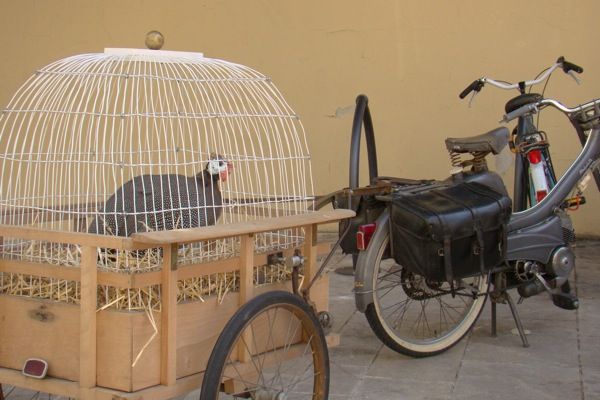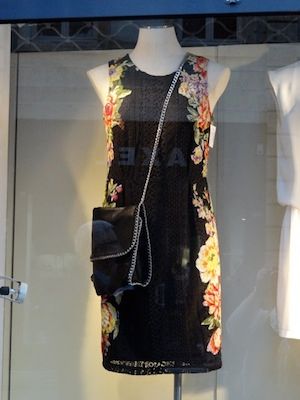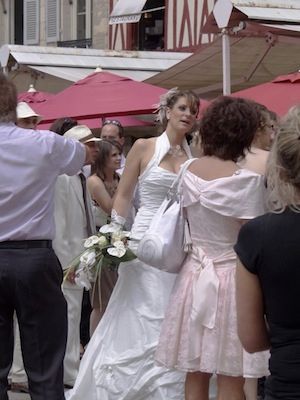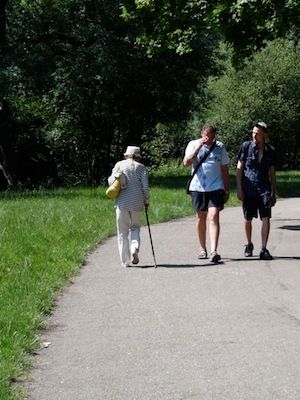Whatever job I don't have, at least I wasn't chauffeur to a turkey
Name?
Address?
Occupation?
I guess beginning today I can officially put “writer.” If I say it, it must be true?
At what point does a woman who loves to put words on paper shift from being a language hobbyist to someone whose occupation is “writer”? I’m still trying to figure that out. Trying on the word for size.
This week begins my MFA program in Creative Nonfiction at Ashland University. Two school years and three summer residencies of writing writing writing. And more writing. I’m pretty sure at the end of it all I would have earned the title of “writer.” But if a writer writes in the woods and nobody publishes her, is she really a writer?
What to call myself has been a point of distress of many years. I spent two decades teaching college students. I had a title and a desk and a place to go to at 8:00 a.m. every Monday. On this strength of these circumstances I could request free books from publishers on the pretext that I might teach them in some future class. I had an unending supply of pens. I had a paycheck. I had something to say on our annual income tax forms.
After I stopped teaching to care for those in the family who needed my attention more than college freshmen I suddenly found myself Nobody. Time after time I would hit that dreadful line on some doctor’s registration form, or income tax form, or someone would ask at a party “What do you do?” and I’d stumble. What did I do?
As a female raised at the height of feminist struggles, it grated to think of putting down “housewife.” Even my mom had gone to an office every day since I was in grade school. She may have been one of a pool of secretaries – imposed upon, ignored, underpaid and over worked, without whom the school could not operate – but at least she could tell people, “I’m a secretary.”
Address?
Occupation?
I guess beginning today I can officially put “writer.” If I say it, it must be true?
At what point does a woman who loves to put words on paper shift from being a language hobbyist to someone whose occupation is “writer”? I’m still trying to figure that out. Trying on the word for size.
This week begins my MFA program in Creative Nonfiction at Ashland University. Two school years and three summer residencies of writing writing writing. And more writing. I’m pretty sure at the end of it all I would have earned the title of “writer.” But if a writer writes in the woods and nobody publishes her, is she really a writer?
What to call myself has been a point of distress of many years. I spent two decades teaching college students. I had a title and a desk and a place to go to at 8:00 a.m. every Monday. On this strength of these circumstances I could request free books from publishers on the pretext that I might teach them in some future class. I had an unending supply of pens. I had a paycheck. I had something to say on our annual income tax forms.
After I stopped teaching to care for those in the family who needed my attention more than college freshmen I suddenly found myself Nobody. Time after time I would hit that dreadful line on some doctor’s registration form, or income tax form, or someone would ask at a party “What do you do?” and I’d stumble. What did I do?
As a female raised at the height of feminist struggles, it grated to think of putting down “housewife.” Even my mom had gone to an office every day since I was in grade school. She may have been one of a pool of secretaries – imposed upon, ignored, underpaid and over worked, without whom the school could not operate – but at least she could tell people, “I’m a secretary.”
My aunt was one, too. Only she worked for a High-Powered Executive in a major corporation in my hometown. According to the rules, secretaries were allowed to earn only so much. Their salary was capped and there they would stay until they retired. However, the HPE for whom she worked thought she was worth more than that. So to get her justly deserved raises, he would give her new titles every couple of years. He understood, being a HPE, that a title had weight.
But I had no title. No weight in the world. I had nothing to say when people asked the inevitable get-acquainted question. I couldn’t bear to say “I’m a housewife” because I knew that’s not really who I was inside. Yet I had nothing out there to mark the passing of my day or week. No schedules kept. No meetings to make with other people who wore suits and had schedules. No promotions or raises or people to give external validation. Plenty of work to keep me busy, but no job.
A few years ago when this little thought of trying to be a writer bubbled up, I started putting “self-employed” on those forms. It wasn’t exactly like I had a job and made a salary and contributed significantly to any line on our income tax form. It wasn’t a phrase that committed me to any particular profession. But I was writing. If a writer writes in the woods and nobody publishes her, is she a writer?
Writer and social media guru for writers Kristen Lamb recently told her own story about claiming the title “writer.” She takes us through all of the “failures” she experienced which just happened to look like “success” to everyone else. By her definition, a failure is a direction that doesn’t fulfill your specific destiny. To find her success she had to say no to everything else and just write. “I had to let go of amateur thinking,” she said, “and take my job seriously, even if no one could walk into a bookstore and buy my book (yet).” She bravely called herself a writer before anyone else did.
As of today I’m in a writing program surrounded by other people putting words to paper until someday somebody out there might call them writers. But whether or not somebody out there says that to me anytime soon, I’m officially claiming the title.
To be continued . . . .
But I had no title. No weight in the world. I had nothing to say when people asked the inevitable get-acquainted question. I couldn’t bear to say “I’m a housewife” because I knew that’s not really who I was inside. Yet I had nothing out there to mark the passing of my day or week. No schedules kept. No meetings to make with other people who wore suits and had schedules. No promotions or raises or people to give external validation. Plenty of work to keep me busy, but no job.
A few years ago when this little thought of trying to be a writer bubbled up, I started putting “self-employed” on those forms. It wasn’t exactly like I had a job and made a salary and contributed significantly to any line on our income tax form. It wasn’t a phrase that committed me to any particular profession. But I was writing. If a writer writes in the woods and nobody publishes her, is she a writer?
Writer and social media guru for writers Kristen Lamb recently told her own story about claiming the title “writer.” She takes us through all of the “failures” she experienced which just happened to look like “success” to everyone else. By her definition, a failure is a direction that doesn’t fulfill your specific destiny. To find her success she had to say no to everything else and just write. “I had to let go of amateur thinking,” she said, “and take my job seriously, even if no one could walk into a bookstore and buy my book (yet).” She bravely called herself a writer before anyone else did.
As of today I’m in a writing program surrounded by other people putting words to paper until someday somebody out there might call them writers. But whether or not somebody out there says that to me anytime soon, I’m officially claiming the title.
To be continued . . . .
Clearly he's not concerned at the moment with what labels he might carry
Do you have a label or title that you love or hate? Are you searching for a new one? What one word would you most like to put on the “occupation” line of any form – circus bareback rider, astrophysicist, professional chocolate tester? What do you think when you think success? Share who you are in the comments box.




























![Grace [Eventually]: Thoughts on Faith](http://photo.goodreads.com/books/1166504427s/12542.jpg)








